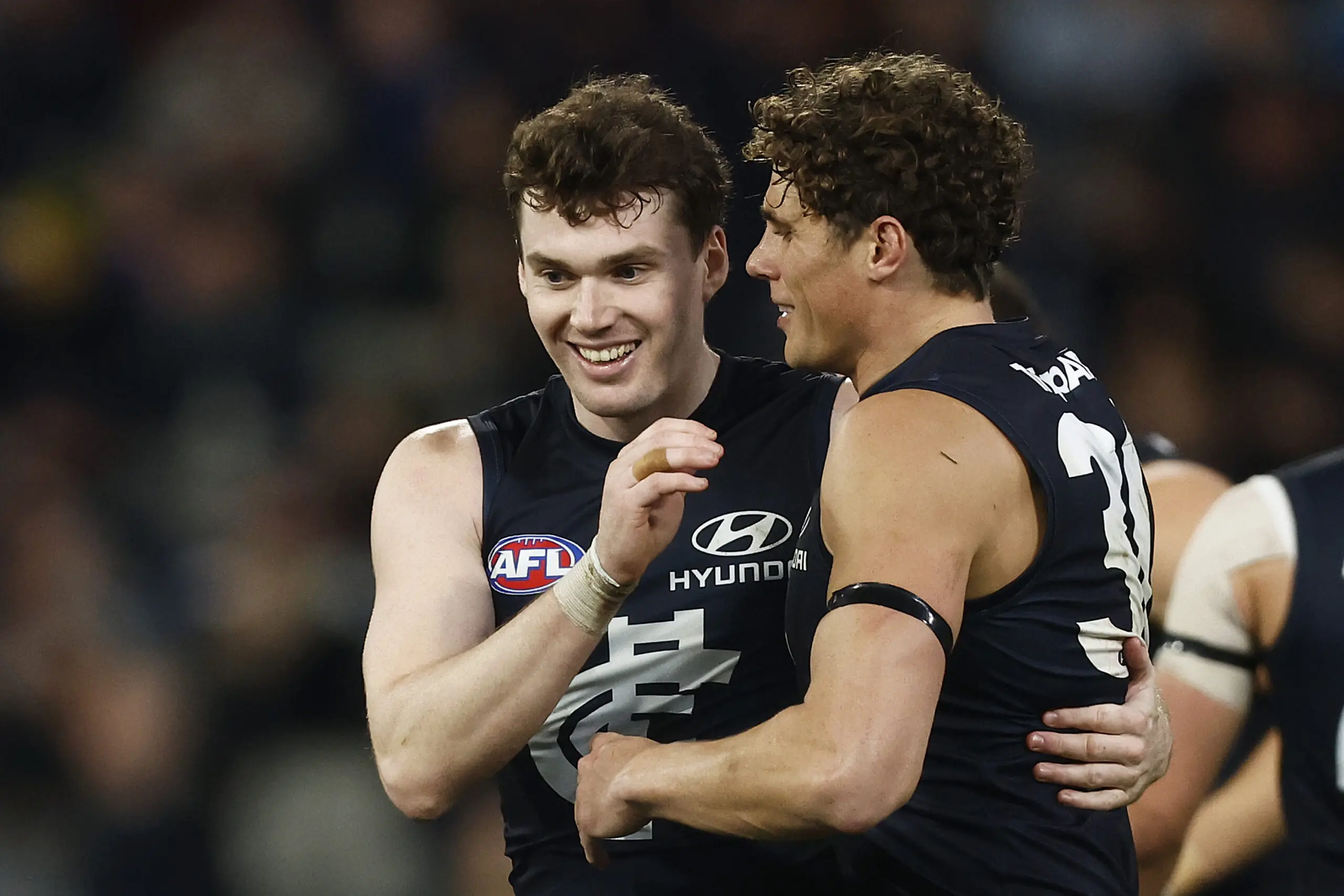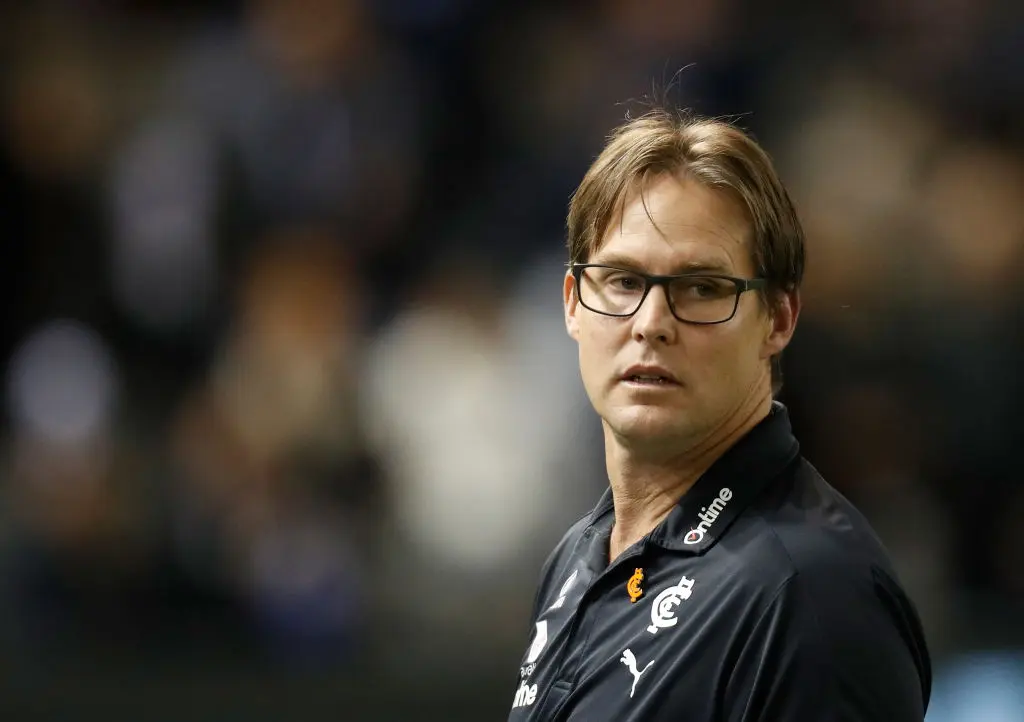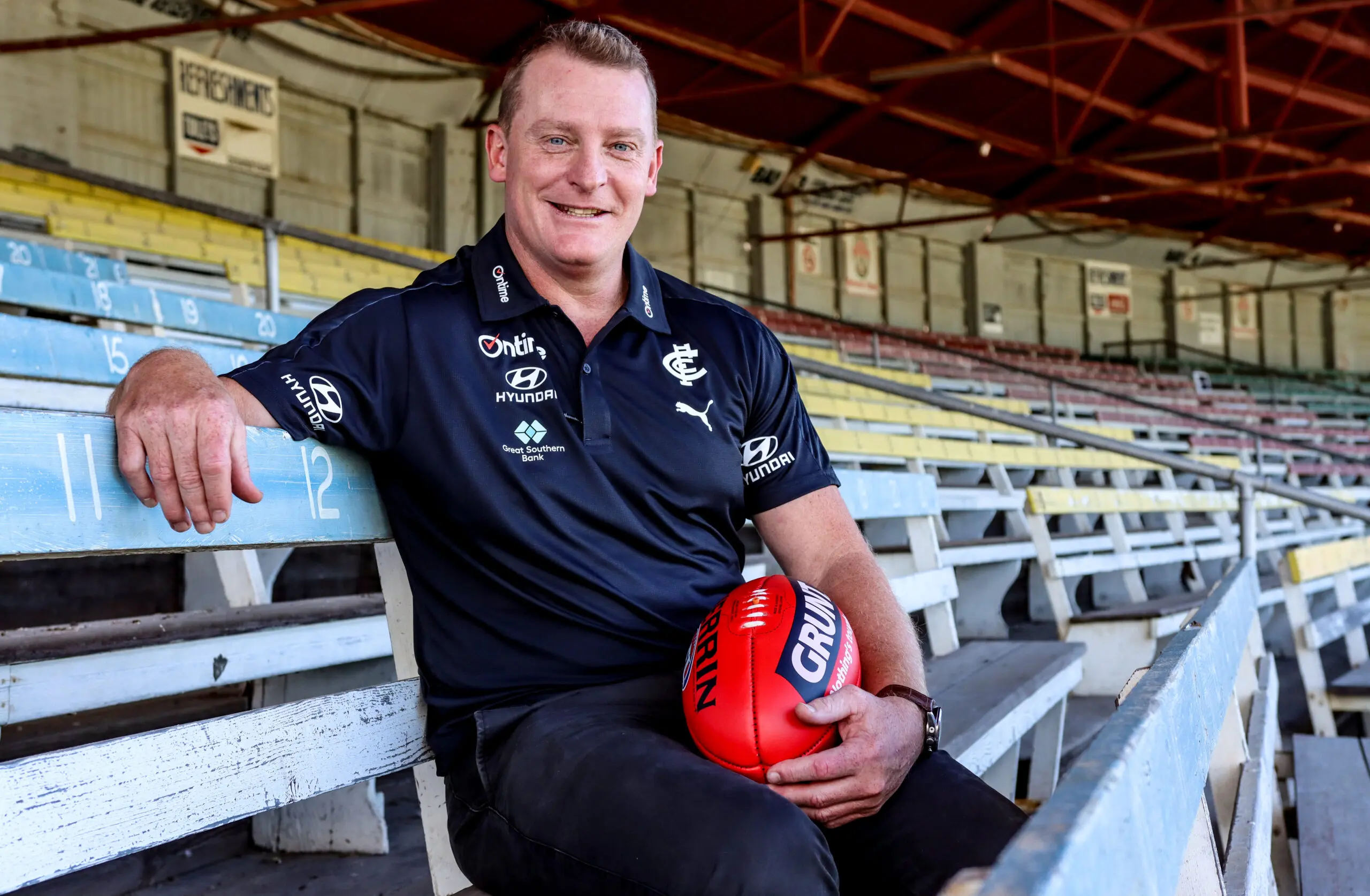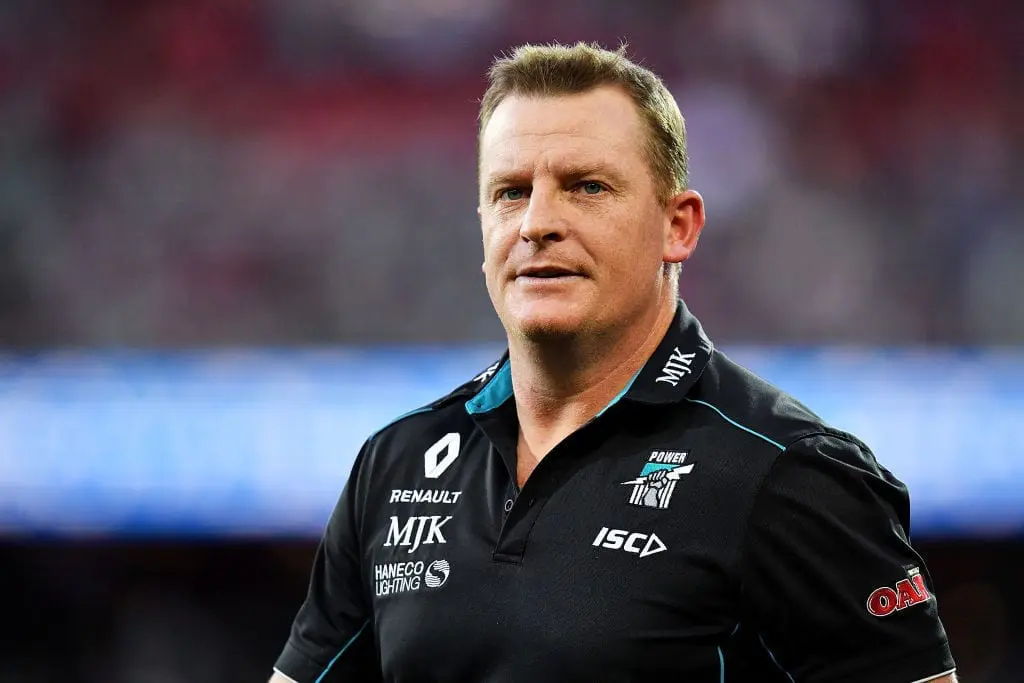Whether you liked or loathed your time in them, some credit where credit is due: Australian schools employ a bloody effective model.
Each year, mixed groups of bright, blunt, mischievous and well-behaved kids are imparted with the knowledge deemed necessary for their age bracket before being handballed up the chain, learning a tougher set of lessons the next year, and the next.
Final tests are eventually taken, pens grasped in sweaty hands, boxes ticked and the scores amassed acting as the gatekeeper between the leaders of tomorrow and the future of their dreams.
But as we all watched the hands tick in those exam halls, few of us thought back on the people who steered us to that point: all of the teachers who taught us right from left, right from wrong and, eventually, scalene from isosceles and the linear from the curved.
Whether or not this lack of introspection can be seen throughout other AFL clubs, nobody should be wearing blinkers at Carlton, with the Blues having employed this same clear model of progression for the better part of the last decade - a model that drove them to within an hour of an unlikely grand final berth last year.

While the Blues have been bagged for their numerous rebuilds, each one failing to shape into anything inhabitable, this one has grown to be different, with the seeds sown by now-departed teachers as important as any lessons imparted by the current head of the clas..
After all, every lasting lesson has led a powerhouse club off its knees, back into contention and away from the butt of stale jokes.
Although nothing has been won yet, if Carlton can regain their status as the most successful - and most loathed - club in the land, the flowers of success deserve dividing, for not so long ago, Princes Park was far more Ridgemont High than it was Princeton, with far more flunking out than ending up on the honour roll.
Flunking out
July 24, 2015.
Friday night. 26,815 in the house. A date against a team on the verge of capping a dynasty. The pressure was low. Perfect conditions for the perfect storm.
The then-Etihad roof may have been closed but the deluge eventually tore through, with the floodgates bursting before long.
38 scoring shots to 15. 27 goals to four. 173 points to 35.
It was the Blues at their lowest on-field ebb. Ever. Never had a premiership flag felt so far away for a club that not so long ago had demanded them.
The canyon between the competition's best side and its worst had been set; it was exactly 23 goals wide.
“I shouldn't say this in front of the cameras, but it's very, very difficult to see where we're going to lose a game," head coach Mick Malthouse said at the Blues' season launch in March that year.
Here was the proof that as long as there is delusion, there is also hope.
It would be just over two months until Hawthorn, Carlton's white-hot opponents that night, would complete its only three-peat in club history. It had been almost a month since the Blues' last win.
While Carlton's 2015 season would end an unmitigated failure that was started by Malthouse and eked out by former Fitzroy forward John Barker - a man more than familiar with strained seasons falling well short of September - the rain would eventually give way to a rainbow and its pot of gold in tow.

It's said you have to give to get, and though Carlton would give up all face that night, they would get the right to turn the page, starting afresh with the finest of ink just four months later.
Yet, the man who would write on history's page was not in Carlton's coaching box that night. He was, however, at the ground, sitting at the right hand of Hawthorn's mastercoach; no doubt beaming his pearly whites in child-like glee.
He may not have earned any AFL experience as a player, but few could deny that at that stage, Brendon Bolton had an AFL resume, constructed with an AFL temperament and steered by a big-league brain.
A proverbial journeyman, Bolton plied his trade as a player, a coach and a playing coach right across the Apple Isle, even representing Tasmania at VFL level, on both sides of the boundary.
A teacher by trade, the head coach with the high beams crossed Bass Strait ahead of the 2009 season, taking up residency leading Box Hill. Soon enough, the promotion papers had been posted, with Bolton moving on from the City Oval to act as Alastair Clarkson's right-hand man under the brightest of lights.
A fan of a challenge, Bolton would eventually stride into Princes Park, lock eyes with his motley crew and announce that class was in session.
But before Bolton could get down to the business of schooling his classroom of castaways, also-rans and ailing first-rounders, he and his recruiting team had a draft to hit.

Summer School
April 15, 2015.
Two games into the season and a full four months and change before Bolton made his way West down the M3, Carlton, the club with more silverware than just about anyone, would announce they were going back to the well, the hard way.
Perhaps to soften the inevitable blow, it would be one of the club's favourite sons that would eventually utter the word footy fanatics and developers alike fear to their core.
Rebuild.
Led by the returning Stephen Silvagni as list boss, the Blues announced that they would be undertaking a 66-game rebuild, effectively using the 2015, 2016 and 2017 seasons to be worked like a speedball before eventually bouncing back to hopefully throw a few haymakers of their own.
Once a club that would sack premiership coaches mere seasons out from glory, Silvagni reconnected Carlton to its ruthless roots, eventually culling 42 players from the club's list between 2015 and 2017.

Following the Baggers' 4-18 2015 season, a true nadir in which their dozen-and-a-half defeats came at a click of 51.6 points per game, Silvagni and company would begin the bloodletting, with eight names delisted, a further four traded out and David Ellard, Andrew Carrazzo and dual Brownlow medallist Chris Judd hanging up the boots.
Carlton's reward for all their wheeling, dealing and defeats? A quartet of first-round draft picks, including the coveted opening selection.
And while the inexact science of selecting blue-chip kids hadn't fueled the Blues any further than a preliminary final loss and a trifecta of semi-final defeats since their most recent grand final appearance in 1999, the arrival of Jacob Weitering (Pick 1), Harry McKay (10), Charlie Curnow (12) and David Cuningham (23) had Bluebaggers everywhere daring to dream.
They say forwards sell memberships and defenders win premierships, but in the class of 2015, Carlton not only had both its poster boys for better days and a pillar down back, it had the core of its core. Bookended by Patrick Cripps and Sam Walsh on either side, the nucleus was completed soon after.
Before ATARs could fully give way to KPIs, however, bonds between this core required forging, with these teenagers, drawn from right across Victoria, asked to get comfortable being uncomfortable.
During the first few weeks of their first summer calling Royal Parade home, Carlton's first-year players were put through their paces on Bruny Island, back in Bolton's neck of the woods.
Still, there would be no handouts for this yet-to-blossom group, only realities injected.
"This whole crew here is entitled to nothing," Bolton barked down the minibus travelling out of Hobart, no doubt harking back to his days leading PE excursions.

There were pats on the backside, though, in between mountain bike bush bashes and one-in, all-in dives to drive unity amongst the pimple-faced throng.
Through the age-old pedagogical technique of call and response, Bolton tactically drew the responses he needed to hear from teenagers set to enter a changing room of men.
When the kids were coy, Bolton, through his soon-to-be trademarked smile, would teach directly, telling the group of their unfettered worth.
"This is a defining draft, if we work hard and stick tight," he would say after a saltwater plunge. "We have reset the footy club and you are vital to it."
"Our future is strong at our footy club," he would stress later on down the beaten track.
But while schooling people, let alone players, on their worth is a callous-forming job, rebuilding a winning record at a club that never parted with its winning demands is another task altogether.
Like every single early educator in the country, Bolton failed to see his preps through to their senior school graduation, with the Blues' brass not willing to stick too tight too long after Bolton's own 66-game mark, parting ways with the Tasmanian after just 16 wins from 77 starts.
"It's another Carlton-first decision," Bolton said with glistening eyes in June of 2019.
"That's the way it is."

As someone still within the industry, Bolton, the current Director of Coaching for arch-rivals Collingwood, is unlikely to be shocked by the tests Carlton's core completed across the back half of last season. After all, schooling this group of All-Australians, Coleman medallists and best and fairest winners to succeed was in his lesson plans all along.
History may not repeat, but it does rhyme because just like that night at Etihad Stadium, the night that Carlton was dealt its largest-ever loss, the man to write the next chapter in the club's history was already in the room on the afternoon Bolton was cast adrift.
Playtime is over
September 3, 2006.
A sunny Sunday afternoon at the SCG, with a packed red and white throng covering the old hill area.
Less than a month out from wrangling the Eagles on grand final day, and proving that sequels could match originals, Sydney was charged with dealing with chump change, as Carlton rolled into Moore Park.
With just a solitary win to their name since May, Denis Pagan's men had half a mind, body and almost all of their collective spirit on the beach in Bali, Bintangs in hand.
A win, though, however desperately unlikely, would see the Blues avoid claiming just their third wooden spoon in club history, or as the sadists could then say, their third since 2002.

As had become customary in the post-Parkin era, things didn't start well, as Sydney skipped out to a five-goals-to-two lead by quarter time, a buffer they would add 15 consecutive majors to by the 17-minute mark of the final term.
And while Carlton would triple their output in junk time, with goals to Brendan Fevola, Jarrad Waite, Luke Blackwell and Barnaby French to work the margin back under the ton, the Blues would end the afternoon not only foisted with the spoon but also farewelling one of just two best and fairest winners still left on their flagging list.
Returning for his last hurrah after an 11-week stint in the twos to amass 11 touches in the 92-point defeat, David Teague may have out-covered his career disposal average, he may also have been the only John Nicholls medallist on the park aside from 'Kouta', but it was clear the stopper was no longer a part of the plans at Princes Park.
Despite the eroding opportunities at senior level, Teague would play a key role for the club, leading top-10 recruits in Marc Murphy and Josh J. Kennedy, either on the training track in Navy Blue or at VFL level in the Northern Bullants' red and white.
These prescient efforts wouldn't go unnoticed either, with Teague earning Best Clubman honours in 2006 for imparting his lessons with a smile instead of souring as the selectors looked elsewhere to fill the back six.

Cramer Street would remain home in the seasons to come as Teague married playing, coaching and developing the Blues' new wave of youngsters, helping the likes of Chris Yarran, Jeff Garlett, Dennis Armfield, Mitch Robinson and Sam Jacobs find their sea legs and earning himself plaudits from industry eyes with a gaze set beyond their navel.
Following back-to-back grand final berths in 2009 and 2010 - including the Ants' first since 1984 - Teague took his talents West, taking the helm of an Eagles forward line on the doorstep of claiming a fourth flag in club history.
From there, the one-time teaching student made tracks to Moorabbin after being offered the reins of a St Kilda defence that was teetering on the precipice. But as the Saints cascaded down the ladder, Teague would eventually be ushered out of Linton Street after just two seasons.
Failure, though, is only failure if you choose not to dust yourself off, and after packing up yet again, Teague headed for West Lakes to lead Adelaide's offensive unit from the fringe to prominence. Under the burgeoning developer's watch, the Crows would ascend to Everest heights as the most potent attack in the league and the threshold of a first flag since Titanic was breaking box offices rather than icebergs.
But with another Navy Blue rebuild on in earnest and a pair of blue-chip forwards needing guidance back home, all of Teague's roads led back to Royal Parade ahead of the 2018 season.

Teague's season and a half as Bolton's assistant would see him play to his pair of strengths - leading youngsters and helping forwards to thrive - with the now-bespectacled steward trading in life with Taylor Walker, Josh Jenkins and Eddie Betts for a future with Curnow, McKay and company.
Business would remain booming, too, as Teague and his twin pillars turned over the page, with Curnow and McKay combining to claim the past six of Carlton's goalkicking gongs, as well as the last three Coleman Medals on offer.
Carlton's previous six winners, you ask? An even mix of Betts, Garlett, Levi Casboult, Matthew Wright and Andrejs Everitt.
No good deed should go unrewarded, no matter whether completed last week or 13 years prior, and as Bolton was ejected from the hot seat with 11 weeks left to run of the 2019 season, Teague was rewarded for his willingness to take a back seat back in the day for the chance to step in and steer this rebuild.
However, as Bolton departed to applause from his assistant-cum-predecessor, stern words would ring in Teague's ears.
"Having acquired four years of elite draft talent, development of that talent must now translate into significant on-field improvement and winning games for the Carlton Football Club," then-President Mark LoGiudice stated with Bolton still beside him and his caretaker watching on.
Playtime was over.

Irrefutably, Teague knew Navy Blue pain all too well, but he also knew how to steer his away from it - steadily, but slowly.
Perhaps spurred by the President's orders, Teague and his Blues would break their moulds, with Carlton winning six of their final 11 games in 2019 - a marker three times the size of their dismal 2017 season on the whole.
Still, with patience his MO, but not that of his board's, Teague's time at the head of the class would always be limited as these interim wins became the outlier and not the norm.
Across Teague's final 39 games before being axed at the end of the 2021 season, Carlton would only win 15 times, with a 95-point humbling in Teague's penultimate clash against Port Adelaide - a crushing defeat that would mirror his final game in boots almost too well.

For a club with a zero-sum ethos, right down to their loafers, selling the hare's speedy wares would always be easier than committing to the tortoise's more meticulous lesson plans.
Carlton's class required a new teacher. One prepared to take this playing group on the verge over it. One who would drag them, kicking and screaming, if need be. One with a Ph.D. in football.
Graduation gowns?
September 23, 2021.
Just like the time before, and the time before that, Carlton's powerbrokers were back before the cameras. Back with a new coach in tow and a bold blueprint.
Wedged between fellow recent arrivals in President Luke Sayers and CEO Brian Cook sat Michael Voss, the 35th man to coach the Carlton Football Club and the eighth since the salary cap saga.
Here was the same guy that had claimed Brownlow Medal honours 25 years earlier. The same guy that steered Brisbane to back-to-back-to-back glory. The same guy who failed first up after trading captaincy for the coaches' box. The same guy, only different.

One of the four leading midfielders of his generation - g'day, too, to Nathan Buckley, James Hird and Robert Harvey - no shred of success evaded Voss during his playing days, not even as a Bear, with the red-headed Queensland transplant ascending at a rate greater than every other soon-to-be-superstar around him.
Yet, after capping his rise by taking Leigh Matthews' throne, things plummeted for Voss, as his hard-line, no-nonsense, all-out attitude failed to land with a team full of homesick youngsters and more chaff than wheat.
Cut loose from the Den with a win-rate south of 40 per cent, Voss could be forgiven for spiralling after being banished from his home of more than half a lifetime. But like any standard-bearer worth their salt, the greatest leader of the turn-of-the-century period would eventually understand the restorative powers of failure.
In failing, Voss was humbled. Yet, in failing, Voss was rewarded with the ability to understand and converse, without hubris, to every single player under his tutelage, from the decorated captain, hell-bent on victory, to the hangers-on, desperate to keep the sun up on their boyhood dreams.
Across his seven seasons as Ken Hinkley's assistant at Alberton, Voss led midfield groups forged with all kinds of players and personalities to succeed; each picked up at every axis of numerous drafts.
Poll any member of Port's midfield from between 2015 and the cessation of the 2021 season, and their message is odds-on to be the same. Voss had found a plan that would work for all sorts, from the top of the food chain to those circling the drain.

Blind Freddy could see this CV correction. And Carlton, a club willing to deal with the devil so as to graduate their stalled stable of talent, extended both an invite and the gauntlet to Voss.
"Our expectation is that we want to aspire to play finals football next year," Sayers said as the ink dried on Voss' contract, he himself only a month into his role.
People outside of Princes Park laughed when Sayers had said the same words a month prior - a point at which he was less than a fortnight into the gig of leading a club without a head coach.
These same deriders would guffaw again when the Blues rattled off four straight losses to end the 2022 season, missing the eight by less than a full percentage point.
The laugher would return through May and July of last season as the Baggers turned, clogging talkback lines before the bye, calling for heads to once again roll.
The brass stuck fat, though, changing the narrative, despite all the calls and trigger-happy hands on the thermostat, working as one to ramp up the heat.
A run home doused in pixie dust had minds moving from dreams of September to dreams in September, only the job wasn't done on preliminary final night. It still isn't. Yet.

After shrugging off several key injuries between them, Weitering, Curnow and McKay, the cream of Carlton's 2015 draft class, have combined to have played 376 games since first being bound by blue in late November of 2015.
Thatch this with the bookends of Cripps (183 games) and Walsh (99), and Carlton is as primed as they have been to contend since the backend of the 90s - only this time the build is both up to spec and to code.
If - not when, as there are no guarantees in this salary-capped game of ours - Voss can climb the dais again, this time in Navy Blue, it should be more than just his name that the Baggers in the outer hail until hoarse. After all, even if they both now call arch-rivals home these, it took Bolton and Teague to sow for Voss to reap.
What is football if not a team game anyway?
Whether it seemed it at the time, each of Carlton's last three head coaches was the right man to lead the Blues' uber-talented list when they put pen to paper.
Bolton, with his smile and positive outlook, was the perfect leader to turn boys into men; Teague, with his understanding of how dark days can get, was the astute hire to put them back on track; Voss, with his steeled will and scars, appears the right man to prepare his group for their final exam.
When it is taken, we're not yet sure. And whether it is passed or not, time will tell. We will have our answer by the final bell.






